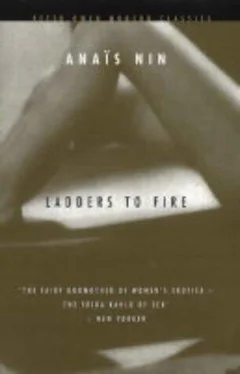Anaïs Nin - Ladders to Fire
Здесь есть возможность читать онлайн «Anaïs Nin - Ladders to Fire» весь текст электронной книги совершенно бесплатно (целиком полную версию без сокращений). В некоторых случаях можно слушать аудио, скачать через торрент в формате fb2 и присутствует краткое содержание. Год выпуска: 2004, ISBN: 2004, Издательство: Peter Owen Limited, Жанр: Классическая проза, Эротические любовные романы, на английском языке. Описание произведения, (предисловие) а так же отзывы посетителей доступны на портале библиотеки ЛибКат.
- Название:Ladders to Fire
- Автор:
- Издательство:Peter Owen Limited
- Жанр:
- Год:2004
- ISBN:9780720611625
- Рейтинг книги:5 / 5. Голосов: 1
-
Избранное:Добавить в избранное
- Отзывы:
-
Ваша оценка:
- 100
- 1
- 2
- 3
- 4
- 5
Ladders to Fire: краткое содержание, описание и аннотация
Предлагаем к чтению аннотацию, описание, краткое содержание или предисловие (зависит от того, что написал сам автор книги «Ladders to Fire»). Если вы не нашли необходимую информацию о книге — напишите в комментариях, мы постараемся отыскать её.
Cities of the Interior
Children of the Albatross
The Four-Chambered Heart
A Spy in the House of Love
Solar Barque
Ladders to Fire — читать онлайн бесплатно полную книгу (весь текст) целиком
Ниже представлен текст книги, разбитый по страницам. Система сохранения места последней прочитанной страницы, позволяет с удобством читать онлайн бесплатно книгу «Ladders to Fire», без необходимости каждый раз заново искать на чём Вы остановились. Поставьте закладку, и сможете в любой момент перейти на страницу, на которой закончили чтение.
Интервал:
Закладка:
She felt at times that she had fallen in love with Jay’s freedom, that she had dreamed he would set her free, but that somehow or other he had been unable to accomplish this.
At night she had the feeling that she was being possessed by a cannibal.
His appetite. The gifts she made him of her feelings. How he devoured the response of her flesh, her thoughts about him, her awareness of him. As he devoured new places, new people, new impressions. His gigantic devouring spirit in quest of substance.
Her fullness constantly absorbed by him, all the changes in her, her dissolutions and rebirths, all this could be thrown into the current of his life, his work, and be absorbed like twigs by a river.
He had the appetite of the age of giants.
He could read the fattest books, tackle the most immense paintings, cover the vastest territories in his wanderings, attack the most solemn system of ideas, produce the greatest quantity of work. He excluded nothing: everything was food. He could eat the trivial and the puerile, the ephemeral and the gross, the scratchings on a wall, the phrase of a passerby, the defect on a face, the pale sonata streaming from a window, the snoring of a beggar on a bench, flowers on the wallpaper of a hotel room, the odor of cabbage on a stairway, the haunches of a bareback rider in the circus. His eyes devoured details, his hands leaped to grasp.
His whole body was like a sensitive sponge, drinking, eating, absorbing with a million cells of curiosity.
She felt caught in the immense jaws of his desire, felt herself dissolving, ripping open to his descent. She felt herself yielding up to his dark hunger, her feelings smoldering, rising from her like smoke from a black mass.
Take me, take me, take my gifts and my moods and my body and my cries and my joys and my submissions and my yielding and my terror and my abandon, take all you want .
He ate her as if she were something he wanted to possess inside of his body like a fuel. He ate her as if she were a food he needed for daily sustenance.
She threw everything into the jaws of his desire and hunger. Threw all she had known, experienced and given before. She gathered all to feed his ravenousness; she went into the past and brought back her past selves, she took the present self and the future self and threw them into the is curiosity, flung them before the greed of his questions.
The red lights from a hotel sign shone into the studio. A red well. A charging, a hoofing, a clanging, a rushing through the body. Thumping. The torrent pressure of a machine, panting, sliding back and forth, back and forth.
Swing. Swing. The bed-like stillness and downiness of summer foliage. Roll. Roll. Clutch and fold. Steam. Steam. The machine on giant oiled gongs yielding honey, rivers of honey on a bed of summer foliage. The boat slicing open the lake waters, ripples extending to the tips of the hair and the roots of the toes.
No stronger sea than this sea of feelings she swam into with him, was rolled by, no waves like the waves of desire, no foam like the foam of pleasure. No sand warmer than skin, the sand and quicksands of caresses. No sun more powerful than the sun of desire, no snow like the snow of her resistance melting in blue joys, no earth anywhere as rich as flesh.
She slept, she fell into trances, she was lost, she was renewed, she was blessed, pierced by joy, lulled, burned, consumed, purified, born and reborn within the whale belly of the night.
At the beginning of their life together he had constantly reverted to his childhood as if to deposit in her hands all the mementos of his early voyages.
In all love’s beginnings this journey backwards takes place: the desire of every lover to give his loved one all of his different selves, from the beginning.
What was most vivid in Jay’s memory was the treachery of his parents.
“I was about six years old when a brand-new battleship docked at the Brooklyn Navy yard. All the boys in the neighborhood had been taken to see it but me. They kept describing it in every detail until I could dream of it as if I had seen it myself. I wanted desperately for my father to take me to it. He kept postponing the visit. Then one day he told me to wash my hands and ears carefully, to put on my best suit and said he was taking me to see the battleship. I washed myself as never before. I walked beside my father neat, and proud and drunk with gaiety. I kept telling him the number of guns we would see, the number of portholes. My father listened with apparent interest. He walked me into a doctor’s office instead, where I had my tonsils taken out. The pain was a million times multiplied by the shock of disillusion, of betrayal, by the violent contrast between my dream, my expectations, and the brutal reality of the operation.”
As he told this story it was clear to Lillian that he still felt the shock of the deception and had never forgiven his father. The intensity of the wish had been made even greater by the poverty of his childhood which made the visit to the battleship a unique pleasure discussed by his playmates for a whole year and not easily forgotten.
“One very cold, snowy night my mother and I were walking towards the river. I was very small, five years old maybe. My mother was walking too fast for me, and I felt terribly cold, especially my hands. My mother carried a muff. Every now and then she took her right hand out of the muff to gb mine when we crossed the streets. The warmth of her hand warmed me all through. Then she would drop my hand again and nestle hers back in her muff. I began to weep: I wanted to put my hand inside of her muff but she wouldn’t let me. I wept and raged as if it were a matter of life and death—probably was, for me. I wanted the warmth and her naked hands. The more I wept and pulled at the muff the harsher my mother got. Finally she slapped my hand so I would let the muff go.”
As he told this his blue eyes became the eyes of an irrevocably angry child. Lillian could see clear through his open eyes as through the wrong end of a telescope, a diminutive Jay raging, cold and thwarted, with his blue frozen hands reaching for his mother’s muff.
This image was not being transmitted to Lillian the woman, but to the responsive child in herself understanding and sharing his anger and disillusion. It was the child in herself who received it as it sank through and beyond the outer layer of the woman who sat there listening with a woman’s full body, a woman’s face. But of this response there was no outer sign showing for Jay to see: the child in her lay so deeply locked within her, so deeply buried, that no sign of its existence or of its response was apparent. It did not beckon through her eyes which showed only a woman’s compassion, nor alter her gestures nor the pose of her body which was the pose of a woman listening to a child and looking at his smallness without herself changing stature. At this moment, like Jay, she could have slipped out of her maturity, of her woman’s body, and exposed her child’s face, eyes, movements, and then Jay would have seen it, known that he had communicated with it, touched it by way of his own childhood, and the child might have met the child and become aware of its similar needs.
By her attitude she did not become one with him in this return to his past self. What she overtly extended to him was one who seemed done with her child self and who would replace the harsh mother, extend the muff and the warm naked hands.
She became, at that instant, indelibly fixed in his eyes not as another child with possibly equal needs, but as the stronger one in possession of the power to dispense to all hisneeds.
From now on was established an inequality in power: he was the cold and hungry one, she the muff and the warm naked hands.
From now on her needs, concealed and buried as mere interferences with the accomplishment of this role, were condemned to permanent muteness. Strong direction was given to her activity as the muff, as the provider of innumerable battleships in compensation for the one he had been cheated of. Giving to him on all levels, from book to blanket to phonograph to fountain pen to food, was always and forever the battleship he had dreamed and not seen. It was the paying off of a debt to the cheated child.
Читать дальшеИнтервал:
Закладка:
Похожие книги на «Ladders to Fire»
Представляем Вашему вниманию похожие книги на «Ladders to Fire» списком для выбора. Мы отобрали схожую по названию и смыслу литературу в надежде предоставить читателям больше вариантов отыскать новые, интересные, ещё непрочитанные произведения.
Обсуждение, отзывы о книге «Ladders to Fire» и просто собственные мнения читателей. Оставьте ваши комментарии, напишите, что Вы думаете о произведении, его смысле или главных героях. Укажите что конкретно понравилось, а что нет, и почему Вы так считаете.












